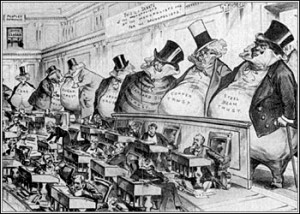Telecommunications and Antitrust Law: The Fulcrum of Technology Policy

Telecommunications regulation and antitrust law have been indispensable partners throughout the development of the U.S. communications industry. Both seek to achieve effectively competitive markets, for the benefit of consumers, and to constrain the acquisition and use of monopoly power.
As a result, many of the most important policy developments in communications over the past 25 years — and before then back to the early 1900s — have their roots both in market-opening regulatory changes by the Federal Communications Commission and in federal antitrust challenges to entrenched communications monopolies, such as the government’s divestiture case against the AT&T-dominated Bell System in 1984. This combination of telecom and antitrust law is likely to serve as the catalyst for government tech policy over the next decade, as the computer and communications industry converge technologically and as the traditional regulatory models applicable to older, differentiated industries continue to break down rapidly. While there are significant impediments to antitrust enforcement in regulated markets as a result of the Supreme Court’s more recent decisions in Trinko and LinkLine, the unregulated (in some ceases deregulated) status of information technology (IT), broadband, IP networking, Web and mobile services, SaaS, VoIP, IPTV and other more nascent technologies suggests that these doctrinal changes will not affect the majority of convergence markets.
Glenn Manishin is well-positioned to guide clients though the labyrinth of telecommunications and antitrust law and to influence the government’s technology policies affecting the communications, Internet and computer industries. He has participated actively in nearly all of the antitrust and regulatory proceedings that have shaped the communications marketplace over the past 20+ years. Glenn began his legal career as an attorney with the Antitrust Division of the U.S. Justice Department in 1982-1985, where he worked on the landmark United States v. AT&T antitrust case and led the government’s initial antitrust investigations in cable television system mergers and overbuilds. Glenn’s antitrust experience includes private treble-damage litigation, Hart-Scott-Rodino and Clayton Act merger proceedings, before both the Justice Department and the Federal Trade Commission, as well as criminal antitrust investigations of spectrum auction bid-rigging and other anticompetitive activities.
Glenn is a recognized expert in issues relating to antitrust and competition in telecommunications in connection with the Telecommunications Act of 1996 and the former Bell System antitrust consent decree. He led the 1996-97 fight against FCC regulation of Internet telephony and imposition of common carrier regulation on Internet service providers, and represented the Computer and High-Tech Coalition, a consortium of Silicon Valley companies, on matters related to standards for set-top box interoperability.
More recently, Glenn has played a significant role on remedy issues in the government’s Sherman Act prosecution of Microsoft, representing opponents of the government’s settlement together with former Judges Robert Bork and Kenneth Starr. He is the founder and chair of the “CLEC Antitrust Council,” formed to support antitrust litigation against the Bell telephone monopolies, and was chosen as litigation counsel for three major CLEC antitrust cases in 2001-03. He brought a series of precedent-setting antitrust actions against a class of commercial real estate owners and managers arising out of an alleged horizontal conspiracy to deny building access to fixed wireless providers. Earlier, Glenn earlier served as outside antitrust counsel to MCI and McCaw Cellular and general counsel for the Interexchange Carriers Industry Committee in 1985-1990.
This deep background allows Glenn to offer a unique mix of strategic, policy and legal advice to firms in any segment of the rapidly converging communications, computer and Internet industries. With the accelerating convergence of computing and telecommunications technology, legal complexities and strategic challenges are increasing. Successful business strategy in the new millennium necessitates an awareness of the constraints imposed by both competitors and government policy. Where relief from the courts, regulatory agencies or legislative bodies is necessary to meet the needs of today’s rapidly changing business environment, Glenn Manishin is equally adept in all forums.
